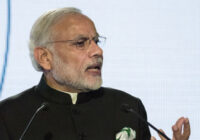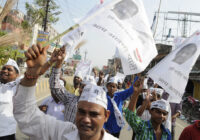India needs tough economic decisions, especially in these turbulent times.
Dear Mr. Arvind Kejriwal,
Heartiest congratulations on the splendid performance of your Aam Aadmi Party (AAP) in the Delhi Vidhan Sabha (local assembly) elections. In spite of the rhetoric, I am certain that your performance in winning 28 out of 70 Vidhan Sabha seats in the party’s electoral debut exceeded expectations of even your in-house psephologist, Yogendra Yadav.
It would be no exaggeration to say that the AAP has shaken the roots of traditional Indian politics, which was till now largely run by opportunistic politicians hankering for power. Arun Jaitley, the leader of the opposition in Rajya Sabha (India’s upper house of national parliament), grudgingly accepted the AAP as "an unconventional party." After all, it is the AAP which soured the celebrations of the Bharatiya Janata Party's (BJP) massive victories in the states of Madhya Pradesh, Rajasthan and Chattisgarh. Even though the BJP won 32 seats in Delhi, it is unable to form a government there, having fallen short of the required simple majority of 36 seats.
The AAP promised to be a whiff of fresh air in Indian politics but it seems you are no different. The events following your electoral success indicate that the AAP has taken little time to adopt the habits of the parties that it loves to condemn. In a disgraceful incident in the village of Ralegan Siddhi, Gopal Rai, your comrade-in-arms, who happens to be a professional politician from his student days at Lucknow University, not only publicly insulted the former army chief, General (Retd) V.K. Singh but also your mentor Anna Hazare.
Both these elderly gentlemen have sterling reputations and it is clear that your party is adopting the methods of disreputable professional politicians who are joining it. More worryingly, it shows intolerance towards dissent and an inability to accept differences of opinion. So, it is time to state some facts.
You are a direct beneficiary of Hazare’s anti-corruption campaign. You came into the public limelight and were able to launch the AAP because of the momentum generated by Hazare’s movement. The country was chafing against the avarice and malfeasance of the politicians. Indians wanted some probity in public life and accountability of people in power. You claim that the AAP is a way to achieve those aims by joining the electoral fray and ostensibly still support Hazare. General Singh has joined forces with Hazare and the two of them are trying to keep up the pressure on the Indian government to implement long-promised reforms. Like Hazare, General Singh established a reputation for honesty in his four decades of public service. He exposed corruption in defense purchases, the lack of ammunition and equipment, and the unpreparedness of the military to face any external threat.
By sending a professional politician like Gopal Rai to misbehave at their public function, you have demonstrated that in the course of one election, you have transformed yourself from a social reformer fighting corruption to a classic politician seeking electoral gains.
Your 18-point charter sent to the Congress and the BJP seems to be an act of pure cynicism. Elections are exercises to form governments. Delhi is without one right now. You have refused to support any of the major parties and declined to form the government yourself. This is despite the fact that Congress has offered you “unconditional support” and the BJP has offered you “constructive support.” Instead, you have declared that you will only accept support if any or both of the two national parties sign up to your 18 points.
You are now no longer an activist but a politician in the business of providing governance. If you were to form the government, you could implement many of your points without needing any legislative approval. If you are serious about bringing change to Indian politics, then you have to accept responsibility and set about providing better governance. Your charter was your election manifesto. You did not win a complete majority, which implies that you do not have enough support for your demands. To insist that you will only form a government when your demands are accepted demonstrates that you are still campaigning like an activist, instead of acting like a responsible politician.
The stalemate in Delhi is an imbroglio created not so much by an indecisive voter, but instead by the political ambitions of the AAP. Your actions belie your statements that you “did not enter politics for power.” If you do not want power and enact your agenda, then let us know why you entered politics. You could have continued as an anti-corruption campaigner alongside Hazare and General Singh. If you want to empower common people and implement the promises of your manifesto, then you could make a beginning by assuming power in Delhi.
You perhaps apprehend that the Congress or BJP might sabotage your government once you take over. Particularly, when you initiate action against corruption, they might pull the plug from you over some trite excuse. It seems that such an action by anyone who supports you would invite opprobrium and backlash. People are fed up with politicians and, if your supporters turned into saboteurs, that would increase your popularity and further their decline.
You have long-been behaving holier-than-thou with other political parties. Yet you increasingly seem to be playing the same game as those you condemn. A few days before the Delhi elections, you met Maulana Tauqeer Raza Khan in Bareilly. Maulana Khan has announced a bounty for former US President George Bush and Bangladeshi writer Taslima Nasreen. There is an argument to be made against the former for being a war criminal, but there is no excuse for announcing a price for his head. Targeting a writer regardless of how much you differ with her is intolerant to the extreme and has no place in modern society. Maulana Khan is known to be a Muslim fundamentalist and has earlier been arrested for inciting riots in 2010. Consorting with him to target the Muslim vote was opportunistic on your part. Your claim of having no knowledge about the “charges leveled against him” is hard to believe.
Finally, the most worrying aspect of your manifesto is its fundamental lack of understanding of economics. It has a populist agenda. The AAP opposes privatization, wants government involved in oil extraction, is in favor of increased taxation, and supports increases in fuel and electricity subsidies. You have called for regularizing contract workers, providing 700 liters of water free of cost to every family and moving people in slums to flats and houses built by the government. All this sounds terrific, but you have failed to shed light on how it proposes to pay for all its promises.
India has been burnt in the past by populism. Indira Gandhi’s "Garibi hatao" (remove poverty) programs in the 1970s did everything except remove poverty. The AAP’s program will add to the regulatory burden in India, provide bureaucrats more opportunities for graft, and unleash inflationary pressures in the economy. India needs tough economic decisions, especially in these turbulent times. It needs painful long-term reforms that unleash the entrepreneurial energy that Indians are famous for, instead of more state intervention in the economy. Simply put, the government cannot run on empty pockets.
You need to realize that people supported the AAP less for its policies and more for its perceived probity. Indians want better governance, honesty in public life, and accountability from its leaders. It is an idea whose time has come. Yet this idea can be frittered away easily. The people of Delhi have just voted and you are refusing to respect their choice. By blocking the formation of a government, the AAP is holding a gun to the head of the very people it claims to fight for.
As you, Mr. Kejriwal, said yourself: "If unwittingly we err, history will not forgive us."
Nice semantics, now walk the talk!
Regards
Mayank Singh
The views expressed in this article are the author's own and do not necessarily reflect Fair Observer’s editorial policy.
Image: Copyright © Shutterstock. All Rights Reserved
Support Fair Observer
We rely on your support for our independence, diversity and quality.
For more than 10 years, Fair Observer has been free, fair and independent. No billionaire owns us, no advertisers control us. We are a reader-supported nonprofit. Unlike many other publications, we keep our content free for readers regardless of where they live or whether they can afford to pay. We have no paywalls and no ads.
In the post-truth era of fake news, echo chambers and filter bubbles, we publish a plurality of perspectives from around the world. Anyone can publish with us, but everyone goes through a rigorous editorial process. So, you get fact-checked, well-reasoned content instead of noise.
We publish 2,500+ voices from 90+ countries. We also conduct education and training programs
on subjects ranging from digital media and journalism to writing and critical thinking. This
doesn’t come cheap. Servers, editors, trainers and web developers cost
money.
Please consider supporting us on a regular basis as a recurring donor or a
sustaining member.
Will you support FO’s journalism?
We rely on your support for our independence, diversity and quality.






Comment